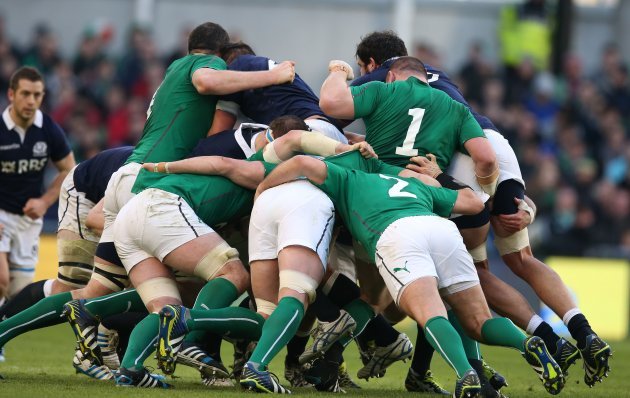WHY DO WE maul?
Ireland gave an ideal demonstration of the primary reason last Sunday, when they powered over Scotland’s line in unstoppable fashion to score their second try of the afternoon. Andrew Trimble’s try on the stroke of half time had roots in the Irish maul too.
Following on from the clear signs of progress in November, forwards coach John Plumtree has set about making the driven line-out a tool for inflicting territorial and psychological damage on the opposition. There is a way to go yet but – like Ireland’s actual maul – things are moving in the right direction.
When I first arrived here, I wanted to make it into a weapon. It’s not a nuclear bomb yet, but when the captain’s got the confidence to go into the corner and the boys score, that’s a good thing. If you don’t, then everyone blames the captain for not taking three points.
But is scoring tries the only reason for mauling? Clearly not, as anyone who has witnessed teams using it inside their own 22 to set up a platform for a clearing kick will testify. Equally, the maul is used as a means of rumbling forward into the opposition half and tying down forwards, thereby creating space for the backs.
Ireland’s theory on having a powerful, feared maul goes a step further than most, as do so many things in the mind of Joe Schmidt. The New Zealander has tasked Plumtree with creating strength in that area in order to reduce the rate at which the defending team gives away penalties against Ireland.
©INPHO/Billy Stickland
Plumtree explains that possessing a strong maul “keeps the defence honest, not wanting to give away penalties in their own half, because they know that we can either kick for goal or go into the corner.”
Schmidt’s attacking game plan is about retaining possession, dragging defences around the pitch with high-tempo phase play and then striking ruthlessly when gaps present themselves. If the opposition are conceding penalties to slow the ball down, then many of those intentions go out the window.
However, the knowledge that concession of a penalty will result in either Jonny Sexton slotting three points or Ireland going to their maul after finding touch from close range may force the defence to think twice.
Plumtree is evidently doing a fine job in developing the Irish maul, although the experienced Welsh pack will provide a sterner wall of defence than Scotland did last weekend. The former Natal Sharks head coach’s job is being made easier by the fine work of men like Anthony Foley – a mauling expert himself – at the provinces.
“I think the bonus for me leading the pack here is that the provinces are all well led, they’ve got good coaches. They’re all pretty passionate about that area as well, so it makes it easier for me when it comes to the Ireland.”


